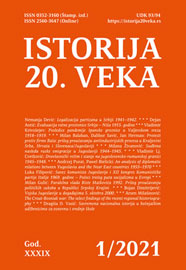DVOVLASNIČKI REŽIM I STANJE NA JUGOSLOVENSKO-RUMUNSKOJ GRANICI 1945–1948.
SITUATION ON YUGOSLAV-ROMANIAN BORDER AND TWO-OWNER ESTATES 1945–1948
Author(s): Vladimir Lj. CvetkovićSubject(s): Social history, WW II and following years (1940 - 1949)
Published by: Institut za savremenu istoriju, Beograd
Keywords: Yugoslavia;Romania;Two-Owner Estates; Border Incidents;Sovietization;
Summary/Abstract: Based on Yugoslav archival sources and relevant literature, the paper examines the situation on the Yugoslav-Romanian border from the end of the World War II until the Cominform Resolution of June of 1948, which led to a deterioration of relations between the two states. By looking at threatening state of security at the border, border incidents, and the functioning of two-owner estates, it is possible to see the attitude and policy of Yugoslavia toward Roma-nia and events on its political scene during its transformation from a parliamen-tary monarchy to a one-party Soviet-type republic. The situation on the border between Yugoslavia and Romania is a good indicator of the impact of changed circumstances on Yugoslav-Romanian relations. Although these relations were traditionally friendly, as they had been in the period between 1945 and 1948, despite their interruption during World War II due to Romania’s siding with the Axis, some distrust was noticeable. It was a consequence of the two countries’ different view on the presence of the Soviet factor, but also of the dispropor-tionate speed with which the process of transforming both states into people’s democracies proceeded. Whereas Yugoslavia viewed the Red Army as a libera-tor and the process of Sovietization was finished quickly, in Romania the same Red Army was seen as an occupier and the mentioned process was slower with incomparably greater resistance. This is because the Romanian Army and gov-ernment administration were often seen as remnants of the previous fascist re-gime and elements of resistance to Sovietization in Romania at the time. On the other hand, from the Romanian point of view, Yugoslavia was perceived as a collaborator and helper of the unwanted Red Army in Romania. On the Yugo-slav-Romanian border mutual distrust and lack of cooperation was present, which resulted in security issues, occasional incidents, and non-functioning of two-owner estates.
Journal: Istorija 20. veka
- Issue Year: 2021
- Issue No: 1
- Page Range: 99-114
- Page Count: 16
- Language: Serbian

